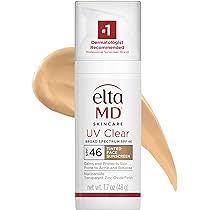
The Ultimate Guide to Finding the Best Sunscreens for Sensitive Skin
Sensitive skin requires extra attention, especially when it comes to sun protection. Exposure to harmful UV rays can lead to sunburn, irritation, and long-term damage like premature aging or hyperpigmentation. However, finding a sunscreen that effectively protects while being gentle on sensitive skin can be a daunting task. This guide will help you navigate the world of sunscreens, offering tips, product recommendations, and insights into what makes a sunscreen suitable for sensitive skin.
Why Sunscreen is Vital for Sensitive Skin
The sun emits two types of harmful ultraviolet rays:
- UVA Rays: Penetrate deep into the skin, causing premature aging and contributing to skin cancer.
- UVB Rays: Cause sunburn and damage the outer layers of the skin.
For people with sensitive skin, these effects are amplified due to a weakened skin barrier, which makes the skin more prone to inflammation, redness, and irritation. Sunscreen acts as a shield, protecting your skin from these harmful rays and ensuring long-term skin health.
Key Benefits of Using Sunscreen on Sensitive Skin
- Prevents sunburn and irritation.
- Reduces the risk of hyperpigmentation and dark spots.
- Protects against premature aging (wrinkles and fine lines).
- Minimizes the risk of skin cancer, including melanoma.
Understanding Sensitive Skin and Sunscreen
Before diving into the best sunscreens, it’s essential to understand what makes skin sensitive and how sunscreen interacts with it.
What is Sensitive Skin?
Sensitive skin reacts easily to external factors like weather, skincare products, or UV rays. Common signs include:
- Redness
- Stinging or burning sensation
- Dryness and flaking
- Frequent breakouts or irritation
What Makes a Sunscreen Suitable for Sensitive Skin?
The right sunscreen should:
- Be free from fragrances and alcohol, which can irritate the skin.
- Contain physical (mineral) filters like zinc oxide or titanium dioxide, which are gentler than chemical filters.
- Be non-comedogenic, ensuring it doesn’t clog pores.
- Offer broad-spectrum protection (shielding against both UVA and UVB rays).
Types of Best Sunscreens for Sensitive Skin
There are two main types of sunscreens:
1. Physical (Mineral) Sunscreens
- Contain zinc oxide and titanium dioxide, which sit on the skin’s surface and reflect UV rays.
- Gentle and less likely to cause irritation, making them ideal for sensitive skin.
- Examples: EltaMD UV Clear Broad-Spectrum SPF 46 and Vanicream Sunscreen SPF 50+.
2. Chemical Sunscreens
- Absorb UV rays and convert them into heat, which is then released from the skin.
- May contain ingredients like oxybenzone or avobenzone, which can irritate sensitive skin.
- Better suited for those with non-sensitive or combination skin.
Top Ingredients to Look For in Sunscreen
Choosing the right ingredients can make all the difference for sensitive skin.
Ingredients to Look For:
- Zinc Oxide: Soothes the skin while offering excellent UV protection.
- Titanium Dioxide: A gentle UV filter that’s less likely to cause irritation.
- Ceramides: Strengthen the skin barrier and retain moisture.
- Niacinamide: Reduces redness and inflammation.
- Hyaluronic Acid: Provides hydration, which is essential for sensitive skin.
Ingredients to Avoid:
- Oxybenzone: A chemical filter that may cause irritation or allergic reactions.
- Fragrance: Unnecessary additives that often lead to sensitivity.
- Alcohol: Dries out the skin and exacerbates irritation.
- Parabens: Preservatives that may irritate sensitive skin.
Top 10 Sunscreens for Sensitive Skin
1. EltaMD UV Clear Broad-Spectrum SPF 46
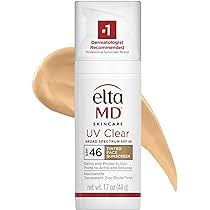
- Why It’s Great: Dermatologist-recommended for its lightweight texture and calming properties.
- Best For: Acne-prone and sensitive skin.
- Pros: Non-comedogenic, fragrance-free, and contains niacinamide.
2. Vanicream Sunscreen SPF 50+
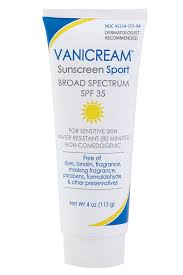
- Why It’s Great: A go-to for individuals with eczema or rosacea.
- Best For: Extremely sensitive skin.
- Pros: Free from dyes, fragrances, and parabens.
3. La Roche-Posay Anthelios Melt-in Milk Sunscreen SPF 100
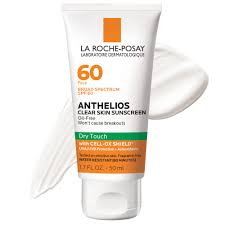
- Why It’s Great: Offers maximum sun protection and is gentle on all skin types.
- Best For: Outdoor activities and prolonged sun exposure.
- Pros: Water-resistant and suitable for both face and body.
4. Aveeno Positively Mineral Sensitive Skin Sunscreen SPF 50
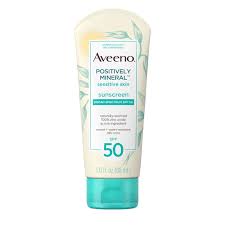
- Why It’s Great: Enriched with oat to soothe irritation.
- Best For: Dry, sensitive skin.
- Pros: Non-greasy and easy to apply.
5. Neutrogena Pure & Free Baby Sunscreen SPF 50
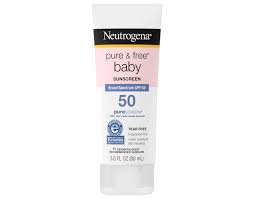
- Why It’s Great: Gentle enough for babies and sensitive adults.
- Best For: Everyday wear for sensitive skin.
- Pros: 100% mineral-based and tear-free.
6. Cetaphil Sheer Mineral Sunscreen SPF 30
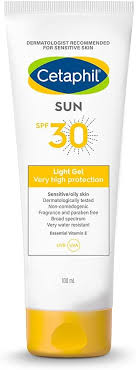
- Why It’s Great: Affordable and dermatologist-approved.
- Best For: Daily use under makeup.
- Pros: Hypoallergenic and fragrance-free.
7. Blue Lizard Sensitive Mineral Sunscreen SPF 50
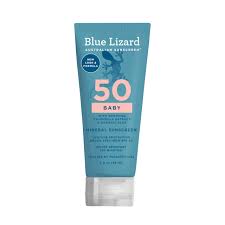
- Why It’s Great: Designed specifically for sensitive skin, this sunscreen offers strong UV protection with a minimalist formula.
- Best For: Sensitive skin that’s prone to redness or irritation.
- Key Ingredients: Zinc oxide and titanium dioxide.
- Pros: Water-resistant, reef-safe, and free of fragrances and parabens.
- Cons: Slightly thicker texture, but blends well with patience.
8. Thinkbaby Safe Sunscreen SPF 50+
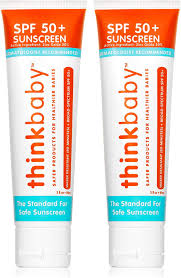
- Why It’s Great: Originally designed for babies, it’s equally suitable for adults with sensitive skin.
- Best For: Everyday use or outdoor activities.
- Key Ingredients: Non-nano zinc oxide.
- Pros: Water-resistant up to 80 minutes, broad-spectrum, and reef-safe.
- Cons: Slight white cast, but perfect for sensitive skin.
9. CeraVe Hydrating Mineral Sunscreen SPF 30
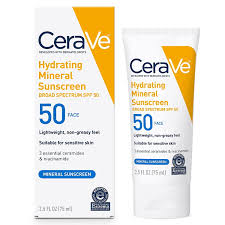
- Why It’s Great: Combines sun protection with hydrating skincare benefits.
- Best For: Dry, sensitive skin.
- Key Ingredients: Ceramides, niacinamide, and zinc oxide.
- Pros: Hydrating, lightweight, and free of chemical filters.
- Cons: Can take a little time to fully absorb.
10. Biossance Squalane + Zinc Sheer Mineral Sunscreen SPF 30
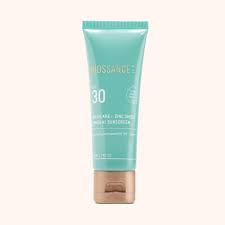
- Why It’s Great: Combines mineral sunscreen with hydrating squalane for a smooth, non-greasy finish.
- Best For: Those seeking a luxurious, sensitive-skin-friendly option.
- Key Ingredients: Zinc oxide and squalane.
- Pros: Sheer finish, hydrating, and suitable for sensitive and acne-prone skin.
- Cons: Higher price point, but worth it for the skincare benefits.
How to Choose the Right Sunscreen for You
1. Consider Your Skin Type
- Oily Skin: Look for oil-free, mattifying formulas.
- Dry Skin: Opt for hydrating sunscreens with ceramides or hyaluronic acid.
- Combination Skin: Choose a lightweight, non-greasy formula.
2. Check the Label
- Look for terms like “dermatologist-tested,” “hypoallergenic,” and “non-comedogenic.”
3. Perform a Patch Test
- Test the product on a small area of your skin before full application.
Tips for Applying Sunscreen
- Apply Generously: Use a nickel-sized amount for your face and more for your body.
- Reapply Every 2 Hours: Especially after swimming or sweating.
- Use Under Makeup: Apply sunscreen as the last step in your skincare routine before makeup.
- Don’t Skip Your Neck and Ears: These areas are often neglected but equally vulnerable to UV damage.
Sunscreen Myths and Facts
Myth 1: Sunscreen is Only Necessary in Summer
- Fact: UV rays are present year-round, even on cloudy days.
Myth 2: Higher SPF Always Means Better Protection
- Fact: SPF 30 blocks about 97% of UVB rays, and higher SPFs provide marginally more protection.
Myth 3: Sunscreen Causes Breakouts
- Fact: Non-comedogenic sunscreens are specifically formulated to prevent clogged pores.
DIY Sunscreens: A Risky Choice
While DIY skincare can be fun, creating sunscreen at home is not recommended. Homemade formulas lack regulated SPF levels and broad-spectrum protection, putting your skin at risk.
Conclusion
Finding the right sunscreen for sensitive skin is crucial for maintaining healthy, radiant skin. By choosing gentle, effective, and dermatologist-recommended products, you can enjoy the sun safely without irritation or discomfort. Use this guide to explore the best options and protect your skin every day.
